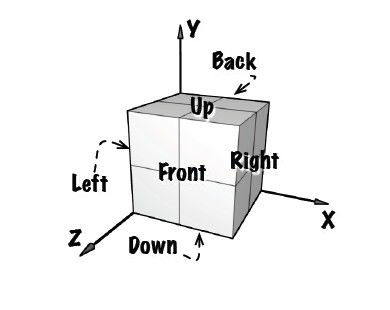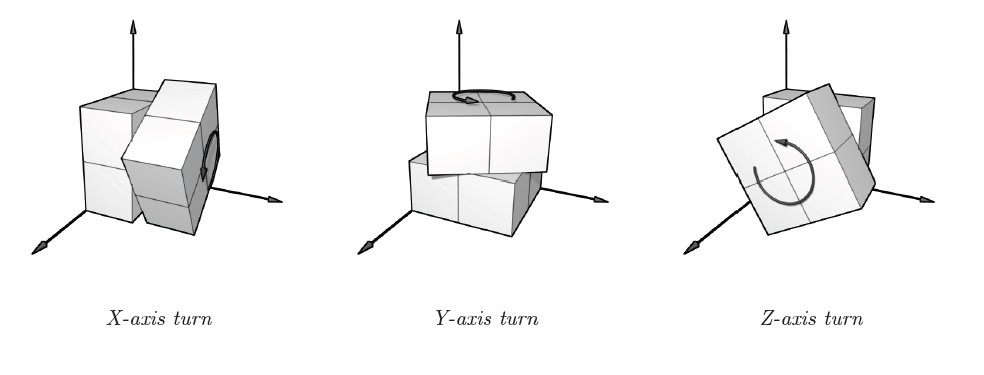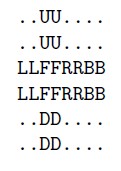HDU3459:Rubik 2×2×2(IDA)
Problem Description
Sonny is probably the only computer science Ph.D. student who cannot solve a Rubik's cube. One day, he came across a neat little 2×2×2 Rubik's cube, and thought, "Finally, here's a cube that's easy enough for me to do!" Nope,
wrong! He got pwned, hardcore. How embarrassing.To ensure that this does not happen again, he decides to write a computer program to solve the cube.
Then he had this brilliant idea: Why not have the students at the programming contest do the work instead? So, given an initial con guration of the 2×2×2 Rubik's cube, your task for this problem is to write a program that solves it.
The mini-cube has 6 faces, each with 4 painted tiles on it. The faces are labeled Front (F), Back (B),Up (U), Down (D), Left (L), and Right (R), according to the diagram below. Each of the tiles on the faces can be colored Red (R), Green (G), Blue (B), Yellow (Y), Orange (O), or White (W), and there are exactly
4 instances of each color. The cube is considered solved when the colors of all tiles on each distinct face of the cube match.
cube, in the directions illustrated below. Note that the back-down-left corner is fixed with respect to all valid transforms.
Then he had this brilliant idea: Why not have the students at the programming contest do the work instead? So, given an initial con guration of the 2×2×2 Rubik's cube, your task for this problem is to write a program that solves it.
The mini-cube has 6 faces, each with 4 painted tiles on it. The faces are labeled Front (F), Back (B),Up (U), Down (D), Left (L), and Right (R), according to the diagram below. Each of the tiles on the faces can be colored Red (R), Green (G), Blue (B), Yellow (Y), Orange (O), or White (W), and there are exactly
4 instances of each color. The cube is considered solved when the colors of all tiles on each distinct face of the cube match.

cube, in the directions illustrated below. Note that the back-down-left corner is fixed with respect to all valid transforms.

Input
You will be given maps of an "unwrapped" cubes showing colors on each of the faces, in the following format:


Output
For each cube, output on a single line a sequence of moves that will solve the cube. Output `X' for a turn about the X-axis, `Y' for a turn about the Y-axis, and `Z' for a turn about the Z-axis. Any sequence of moves (that
is reasonably finite) which solves the given confi guration will do. (After all, Sonny does need to execute your commands to verify that your program works!) A blank line will suffice for an input cube that is already solved.
Sample Input
..WO.... ..WO.... BBOYGGWR BBOYGGWR ..YR.... ..YR.... ..GY.... ..BY.... ROYWRRBB GWOWRBOW ..YG.... ..OG.... ........ ........ ........ ........ ........ ........
Sample Output
X YZXXXZYZXYXYZZYZZYZXYY
题目虽长,可是题意非常easy。就是一个拼魔方的游戏,要求输出步骤
事实上代码的思路也不难,仅仅是写起来非常麻烦蛋疼
从图中不难看出。不管魔方怎么旋转,与原点相接的那个小方块是不动的,那么我们能够由原点的小方块得出三个面的终于颜色,然后再通过这三个面去确定其它三个面的颜色
然后就是IDA的剪枝估測函数的h值,因为每次旋转可以改变8个小面,那么仅仅要求出如今不在其位的面总数SUM,得出(sum+7)/8就可以,加7是保证sum+7>=8得出步数
#include <stdio.h>
#include <string.h>
#include <algorithm>
using namespace std;
struct node
{
int x,y;
} cube[10][10],side[10][10];
char color[10],rubik[10][10];
int ans[1000];
int flag,step;
void init()//cube代表每一个小立方体的3个面相应字符数字的哪个位置,side则是6个面,每一个面的四个元素各自是什么
{
cube[0][0].x=3,cube[0][0].y=2;
cube[0][1].x=3,cube[0][1].y=1;
cube[0][2].x=4,cube[0][2].y=2;
cube[1][0].x=3,cube[1][0].y=3;
cube[1][1].x=3,cube[1][1].y=4;
cube[1][2].x=4,cube[1][2].y=3;
cube[2][0].x=2,cube[2][0].y=2;
cube[2][1].x=2,cube[2][1].y=1;
cube[2][2].x=1,cube[2][2].y=2;
cube[3][0].x=2,cube[3][0].y=3;
cube[3][1].x=1,cube[3][1].y=3;
cube[3][2].x=2,cube[3][2].y=4;
cube[4][0].x=3,cube[4][0].y=0;
cube[4][1].x=5,cube[4][1].y=2;
cube[4][2].x=3,cube[4][2].y=7;
cube[5][0].x=5,cube[5][0].y=3;
cube[5][1].x=3,cube[5][1].y=5;
cube[5][2].x=3,cube[5][2].y=6;
cube[6][0].x=0,cube[6][0].y=2;
cube[6][1].x=2,cube[6][1].y=7;
cube[6][2].x=2,cube[6][2].y=0;
cube[7][0].x=0,cube[7][0].y=3;
cube[7][1].x=2,cube[7][1].y=5;
cube[7][2].x=2,cube[7][2].y=6;
side[0][0].x=0,side[0][0].y=2;
side[0][1].x=0,side[0][1].y=3;
side[0][2].x=1,side[0][2].y=2;
side[0][3].x=1,side[0][3].y=3;
side[1][0].x=2,side[1][0].y=0;
side[1][1].x=2,side[1][1].y=1;
side[1][2].x=3,side[1][2].y=0;
side[1][3].x=3,side[1][3].y=1;
side[2][0].x=2,side[2][0].y=2;
side[2][1].x=2,side[2][1].y=3;
side[2][2].x=3,side[2][2].y=2;
side[2][3].x=3,side[2][3].y=3;
side[3][0].x=2,side[3][0].y=4;
side[3][1].x=2,side[3][1].y=5;
side[3][2].x=3,side[3][2].y=4;
side[3][3].x=3,side[3][3].y=5;
side[4][0].x=2,side[4][0].y=6;
side[4][1].x=2,side[4][1].y=7;
side[4][2].x=3,side[4][2].y=6;
side[4][3].x=3,side[4][3].y=7;
side[5][0].x=4,side[5][0].y=2;
side[5][1].x=4,side[5][1].y=3;
side[5][2].x=5,side[5][2].y=2;
side[5][3].x=5,side[5][3].y=3;
}
char get_color(int A,int B,int C) //通过小格子的颜色获得每一个面的颜色
{
for(int i=0; i<8; i++)
{
if(rubik[cube[i][0].x][cube[i][0].y]==color[A]&&rubik[cube[i][1].x][cube[i][1].y]==color[B]&&rubik[cube[i][2].x][cube[i][2].y]!=color[C])
return rubik[cube[i][2].x][cube[i][2].y];
if(rubik[cube[i][1].x][cube[i][1].y]==color[A]&&rubik[cube[i][0].x][cube[i][0].y]==color[B]&&rubik[cube[i][2].x][cube[i][2].y]!=color[C])
return rubik[cube[i][2].x][cube[i][2].y];
if(rubik[cube[i][0].x][cube[i][0].y]==color[A]&&rubik[cube[i][2].x][cube[i][2].y]==color[B]&&rubik[cube[i][1].x][cube[i][1].y]!=color[C])
return rubik[cube[i][1].x][cube[i][1].y];
if(rubik[cube[i][2].x][cube[i][2].y]==color[A]&&rubik[cube[i][0].x][cube[i][0].y]==color[B]&&rubik[cube[i][1].x][cube[i][1].y]!=color[C])
return rubik[cube[i][1].x][cube[i][1].y];
if(rubik[cube[i][1].x][cube[i][1].y]==color[A]&&rubik[cube[i][2].x][cube[i][2].y]==color[B]&&rubik[cube[i][0].x][cube[i][0].y]!=color[C])
return rubik[cube[i][0].x][cube[i][0].y];
if(rubik[cube[i][2].x][cube[i][2].y]==color[A]&&rubik[cube[i][1].x][cube[i][1].y]==color[B]&&rubik[cube[i][0].x][cube[i][0].y]!=color[C])
return rubik[cube[i][0].x][cube[i][0].y];
}
}
void turn_x(char maze[10][10]) //x轴
{
char tmp;
tmp=maze[2][4];
maze[2][4]=maze[2][5];
maze[2][5]=maze[3][5];
maze[3][5]=maze[3][4];
maze[3][4]=tmp;
tmp=maze[1][3];
maze[1][3]=maze[2][6];
maze[2][6]=maze[5][3];
maze[5][3]=maze[3][3];
maze[3][3]=tmp;
tmp=maze[0][3];
maze[0][3]=maze[3][6];
maze[3][6]=maze[4][3];
maze[4][3]=maze[2][3];
maze[2][3]=tmp;
}
void turn_y(char maze[10][10]) //y轴
{
char tmp;
tmp=maze[2][0];
maze[2][0]=maze[2][6];
maze[2][6]=maze[2][4];
maze[2][4]=maze[2][2];
maze[2][2]=tmp;
tmp=maze[2][1];
maze[2][1]=maze[2][7];
maze[2][7]=maze[2][5];
maze[2][5]=maze[2][3];
maze[2][3]=tmp;
tmp=maze[0][2];
maze[0][2]=maze[0][3];
maze[0][3]=maze[1][3];
maze[1][3]=maze[1][2];
maze[1][2]=tmp;
}
void turn_z(char maze[10][10]) //z轴
{
char tmp;
tmp=maze[2][1];
maze[2][1]=maze[1][3];
maze[1][3]=maze[3][4];
maze[3][4]=maze[4][2];
maze[4][2]=tmp;
tmp=maze[3][1];
maze[3][1]=maze[1][2];
maze[1][2]=maze[2][4];
maze[2][4]=maze[4][3];
maze[4][3]=tmp;
tmp=maze[2][2];
maze[2][2]=maze[2][3];
maze[2][3]=maze[3][3];
maze[3][3]=maze[3][2];
maze[3][2]=tmp;
}
int get_h(char mid[10][10])
{
int i,j,sum = 0;
for(i = 0; i<6; i++)
{
for(j = 0; j<4; j++)
{
if(mid[side[i][j].x][side[i][j].y]!=color[i])
sum++;
}
}
return (sum+7)/8;
}
int IDA(char mid[10][10],int cnt)
{
if(cnt+get_h(mid)>step)
return 0;
if(cnt == step)
return 1;
for(int i = 0; i<3; i++)
{
char tem[10][10];
for(int x = 0; x<6; x++)
for(int y = 0; y<8; y++)
tem[x][y]=mid[x][y];
if(i == 0)
turn_x(tem);
else if(i == 1)
turn_y(tem);
else
turn_z(tem);
ans[cnt] = i;
if(IDA(tem,cnt+1))
return 1;
}
return 0;
}
int main()
{
int i;
init();
while(~scanf("%s",rubik[0]))
{
for(i = 1; i<6; i++)
scanf("%s",rubik[i]);
if(!strcmp(rubik[0],"........"))
break;
color[1]=rubik[3][0];
color[5]=rubik[5][2];
color[4]=rubik[3][7];
color[0]=get_color(1,4,5);
color[2]=get_color(1,5,4);
color[3]=get_color(4,5,1);
step = 0;
while(1)
{
if(IDA(rubik,0)) break;
step++;
}
for(i = 0; i<step; i++)
printf("%c",ans[i]+'X');
printf("\n");
}
return 0;
}



 浙公网安备 33010602011771号
浙公网安备 33010602011771号